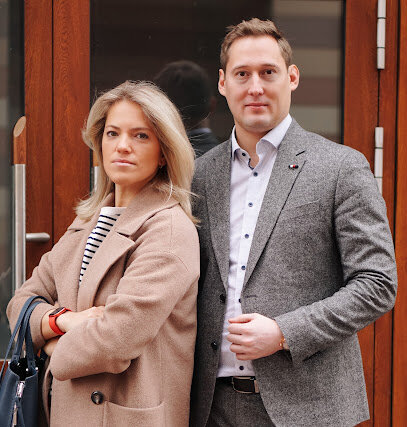Best International Trade Law Lawyers in Perm
Share your needs with us, get contacted by law firms.
Free. Takes 2 min.
List of the best lawyers in Perm, Russia
About International Trade Law Law in Perm, Russia
International trade law in Perm, Russia covers the rules and practices that govern cross-border sale, movement, and regulatory compliance of goods and services involving entities based in Perm Krai. Trade in Russia is governed by a mix of federal legislation, Eurasian Economic Union rules, and regional administrative practice. Key practical areas include customs clearance, import and export controls, product conformity and technical regulation, taxation of international transactions, licensing for certain controlled goods, and compliance with sanctions and trade restrictions. If you are doing business in Perm that involves foreign partners, carriers or markets, understanding these legal frameworks is essential to avoid delays, fines and liability.
This guide provides an accessible overview for people unfamiliar with the field. It is informational only and not a substitute for legal advice tailored to your situation.
Why You May Need a Lawyer
International trade involves multiple intersecting legal and administrative regimes. You may need a lawyer in the following common situations:
- Contract drafting and review for international sale, distribution, agency, manufacturing or logistics agreements to protect commercial terms and limit risk.
- Customs clearance problems - classification disputes, valuation questions, detained shipments, or incorrectly declared goods.
- Licensing and export control issues - obtaining permits for controlled or dual-use goods, or responding to export control inquiries.
- Sanctions and restricted transactions - assessing whether counterparties, banks or goods are subject to foreign or Russian sanctions and putting in place compliance measures.
- Product compliance and certification - meeting EAEU technical regulations, sanitary and phytosanitary rules, labeling and packaging requirements for the Russian market.
- Tax and duty planning - structuring transactions to lawfully minimize customs duties, VAT on imports and related taxes, and handling disputes with the tax or customs authorities.
- Dispute resolution - commercial litigation, arbitration, pre-trial settlement negotiations, or enforcement of foreign judgments and arbitral awards in Russia.
- Investigations and penalties - defending against administrative fines or criminal investigations for customs fraud, smuggling or other alleged violations.
Local Laws Overview
The legal landscape that most directly affects international trade activity in Perm includes the following elements:
- Customs regulation - Russia applies EAEU customs rules alongside national implementation. Customs declarations, tariff classification, customs value, and required documentary support are regulated by the Federal Customs Service and applicable EAEU acts.
- Import duties and VAT - Imports are usually subject to customs duties and Russian VAT at importation. Specific rates depend on tariff classification and any preferential regimes or trade agreements.
- EAEU technical regulations - Product safety and conformity are governed by EAEU technical regulations and national implementation rules. Certification, declaration of conformity, and labeling in Russian are commonly required for market entry.
- Sanitary, phytosanitary and consumer safety controls - Rospotrebnadzor and Rosselkhoznadzor carry out checks and require permits and certificates for food, agriculture and certain consumer goods.
- Export controls and licensing - Strategic, dual-use and certain high-tech goods require export licenses or notifications. The Ministry of Industry and Trade and security services are involved in licensing and control.
- Currency and foreign exchange controls - Contracts and cross-border payments must comply with Russian currency regulation and reporting requirements, including documentation for foreign trade transactions.
- Administrative and criminal liability - Customs and trade law violations can trigger administrative fines, confiscation of goods, or criminal charges for smuggling and fraud.
- Regional practice - Perm Krai authorities and the regional branch of federal agencies may have local procedural practices, and logistics arrangements in Perm influence timing and costs for clearance and transit.
Frequently Asked Questions
How do I import goods into Perm from abroad?
To import into Perm you must prepare a commercial invoice, packing list, transport documents, and any certificates or licenses required for the goods. File a customs declaration with the Federal Customs Service via an authorized customs broker or directly if you are a registered participant. Pay applicable customs duties, VAT and fees. Ensure product conformity documentation - certification or declaration - and sanitary or phytosanitary permits are in order to avoid detention.
What determines customs duty and VAT on imported goods?
Customs duty depends on the tariff classification (HS code) and the applicable rate for that code, adjusted for trade regimes and preferential treatments. Customs value is usually based on the transaction value with adjustments. VAT at import applies to the customs value plus duty and other taxable bases. Specific exemptions or reduced rates may apply depending on the product and legal regime.
How do I classify my goods for customs purposes?
Goods are classified under the Harmonized System codes used in the EAEU tariff schedule. Classification requires a factual description of the goods, their composition, purpose and packaging. Mistakes in classification can lead to additional duties, fines or seizure. A lawyer or customs consultant can help prepare a reasoned classification position and, if needed, request an official binding classification from customs authorities.
Do I need licenses or permits to export from Perm?
Some goods require export licenses or notifications - notably strategic, dual-use, military-related items, certain natural resources and cultural heritage objects. Other products need sanitary, phytosanitary or veterinary permits for export. Check commodity-specific rules and obtain required permits from federal authorities before shipping.
What should I do if customs detains my shipment?
If customs detains goods, identify the stated reason - documentation deficiencies, suspicion of false declaration, missing permits, or suspected violation. Promptly provide missing documents or challenge the detention through administrative procedures. A lawyer experienced in customs disputes can represent you, prepare appeals, and advise on temporary release options or bonded storage.
How do sanctions affect trade activities in Perm?
Sanctions - whether foreign or Russian countermeasures - can restrict certain transactions, block access to financial services, or prohibit supply of specific goods. Assess counterparties against sanctions lists, review contractual clauses on sanctions, and obtain legal advice before completing high-risk transactions. Non-compliance can lead to blocked payments, seizure of goods, fines or criminal exposure.
Can a foreign company enforce a contract in Perm courts or arbitration?
Yes. Foreign companies can bring claims in Russian courts or arbitral tribunals if jurisdiction is established by contract or law. Many international contracts select arbitration and specify rules and seats. If enforcing a foreign judgment or arbitral award in Russia, specific recognition and enforcement procedures apply; working with a local lawyer is essential to navigate procedural requirements.
How long does customs clearance typically take in Perm?
Clearance time depends on the nature of goods, completeness of documentation, need for inspections or laboratory testing, and whether goods are subject to licensing or quarantine. Simple consignments with full documentation may clear in hours to a day. Complex shipments or goods requiring special permits may take days to weeks. Delays increase if documentation is missing or there is an audit.
Do I need a customs broker, and how do I choose one?
A licensed customs broker can manage declarations, payments, communications with customs and practical logistics. Choose a broker with experience in your product category, good local reputation in Perm, transparent pricing, and proper licensing. Verify references and ensure the broker provides clear liability and confidentiality terms.
What are the risks of non-compliance with Russian trade and customs rules?
Risks include administrative fines, seizure or forfeiture of goods, business disruption, reputational damage, and in severe cases criminal charges for smuggling or fraud. Financial risks include additional duties, interest and penalties. Implementing compliance procedures and obtaining specialist legal advice reduces these risks.
Additional Resources
Below are government bodies, organizations and resources that are commonly useful for international trade matters in Perm:
- Federal Customs Service and the regional Perm customs authority
- Eurasian Economic Commission - for EAEU technical and customs rules
- Ministry of Industry and Trade of the Russian Federation - export control and trade policy
- Federal Service for Veterinary and Phytosanitary Surveillance - Rosselkhoznadzor
- Federal Service for Surveillance on Consumer Rights Protection and Human Wellbeing - Rospotrebnadzor
- Federal Tax Service - VAT and tax matters related to trade
- Perm Chamber of Commerce and Industry
- Perm Krai government - trade and investment departments
- Russian Bar Association and local Perm advocate associations - for lists of qualified lawyers
- Professional customs brokers associations and logistics providers in Perm
Next Steps
If you need legal assistance with international trade matters in Perm, consider the following practical steps:
- Gather key documents - sales contracts, invoices, packing lists, transport documents, previous customs declarations and any permits or certificates.
- Identify the main issue - customs classification, licensing, an imminent shipment at risk, sanctions screening or a dispute.
- Seek an initial consultation with a lawyer experienced in customs and international trade - ask about their experience with Perm regional practice, representative matters and fee arrangements.
- Verify professional credentials - ideally an advocate licensed in Russia or a law firm with a proven track record in trade law and customs practice.
- Consider engaging a licensed customs broker for day-to-day clearance work and a lawyer for legal risk assessment and dispute handling.
- Put basic compliance measures in place - sanctions screening, document templates in Russian, proper archiving of customs-related records, and training for staff involved in cross-border transactions.
- Agree a clear engagement letter that sets out scope, fees and confidentiality terms before work begins.
Starting with these steps will help you manage risk and ensure smoother cross-border operations in Perm. If you have a specific situation, consult a qualified trade law lawyer to get tailored advice.
Lawzana helps you find the best lawyers and law firms in Perm through a curated and pre-screened list of qualified legal professionals. Our platform offers rankings and detailed profiles of attorneys and law firms, allowing you to compare based on practice areas, including International Trade Law, experience, and client feedback.
Each profile includes a description of the firm's areas of practice, client reviews, team members and partners, year of establishment, spoken languages, office locations, contact information, social media presence, and any published articles or resources. Most firms on our platform speak English and are experienced in both local and international legal matters.
Get a quote from top-rated law firms in Perm, Russia — quickly, securely, and without unnecessary hassle.
Disclaimer:
The information provided on this page is for general informational purposes only and does not constitute legal advice. While we strive to ensure the accuracy and relevance of the content, legal information may change over time, and interpretations of the law can vary. You should always consult with a qualified legal professional for advice specific to your situation.
We disclaim all liability for actions taken or not taken based on the content of this page. If you believe any information is incorrect or outdated, please contact us, and we will review and update it where appropriate.










